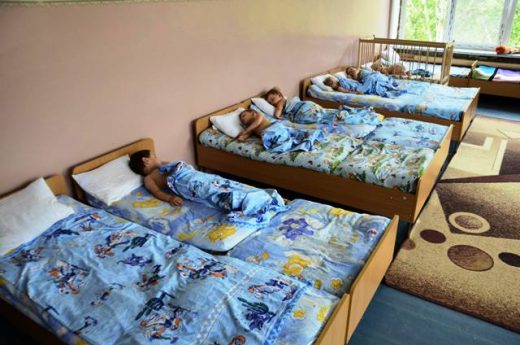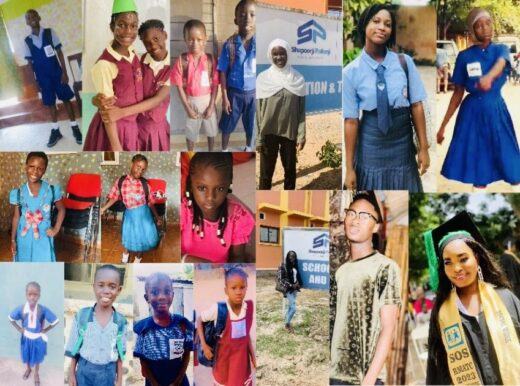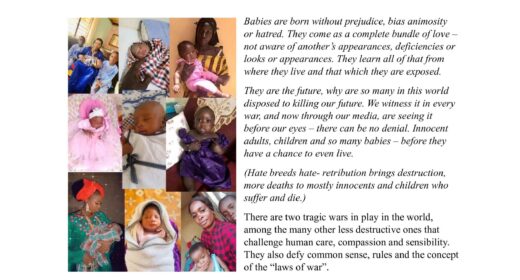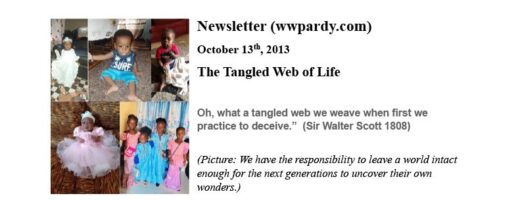
(Picture of Ukrainian War orphans who are looking for a home)
When one looks at the turmoil and despair in the world, one has to give thought to the future viability of human life and existence.
There is the destitution and poverty of so many, the forced migration of millions, the impact of environmental damage, which continues unabated, and its resultant climatic changes
Then there is the nuclear saber rattling of Russia, North Korea and others and the cruelty and savage barbaric killings of multiple terrorist groups and terrorists, who appear to be everywhere, even in the most civilized countries.
It would appear human existence will be short lived.
Those of us privileged currently live in somewhat peaceful environments and go about our lives as if the world was normal. We are only startled by the latest sound bite or gory picture on the news, which quickly fades from memory.
Fortunately we only witness such atrocities from a distance, have no need to scurry to our basements to avoid bombings, nor escape to a distant place under the most arduous of circumstances while watching many die along the way, to hopefully find security and food.
Privileged lives are of the moment, and can change quickly by economic and political mismanagement and the resultant internal strife that is created. This is being demonstrated and currently witnessed in so many countries.
Privilege also brings responsibility. This includes the necessity to contain and constrain political egos, slanted ideologies and greed for money and power.
It also brings the responsibility of having empathy and compassion for those less privileged and without adequate resources and amenities. It necessitates the sharing of our many benefits and advantages.
Need may be our plight in the not too distant future, as it is no longer possible to speculate that our privileged existence will last forever.
There are limits to our resources, our economies, and our systems of governance. Most importantly, it appears there are limits to intelligence, and tolerance, despite our advances in knowledge, technology and innovations.
The big challenge facing humankind is our reticence to accept these limits and accept change, especially, if it is perceived to provide us “less”.
Significant change is required in our attitudes, beliefs and perceived “values”. By this I mean what it is that we truly value.
What we value influences how we think, how we feel and what it is we must do. What it is that we do is the most significant factor for human well being and existence.
There is little that humans can or cannot do both negatively and positively, as has been witnessed throughout history. It depends on what we value, what we believe and how much we are willing to give of ourselves. More importantly, it relates to what we are willing to do collectively as a society.
Throughout the many transitions of human history there have been positive collective actions that led to advancement of the human condition. But, there have been many negative collective actions where people suffered immensely.
This is the precipice on which humanity rests today; one of enlightenment or darkness.
For the past several decades much has been made of the impending age of enlightenment, a brave new world where light and brightness were to shine on everyone.
A belief had grown that the end of poverty, suffering and sorrow was just around the corner. One could smell it, as it was so close.
Then storm clouds began to gather, complacency set in for many and human frailties and perversion gained a foothold.
Ideologies replaced idealism and control replaced cooperation.
The myth of globalization was spawned to disguise the need for control and containment and the concept of community swept aside by the need for urbanization.
Today, there is an impasse throughout the world and a moment for reflection required. What are the privileged willing to forfeit in order for those with little to have some privilege and respect?
There is still plenty in this world for all (even for 7+ billion souls). A rebalancing is required, reordering is necessary and rethinking is essential; not only by those in positions of power, but by everyone who has privilege.
It has been postulated, communicated and taught throughout human history, not only by religions, that the one gift and ability that is inherent in all of humanity, even those most depraved, is the gift and ability of love.
Love has no limits, boundaries nor borders, nor is there need for control. It has no cost, but is priceless.
But, like all gifts, it needs to be given and shared and not hidden nor hoarded, as some would suggest.
The challenge for humanity is to once again place love at the centre of what has value, what is belief and what is commitment.


